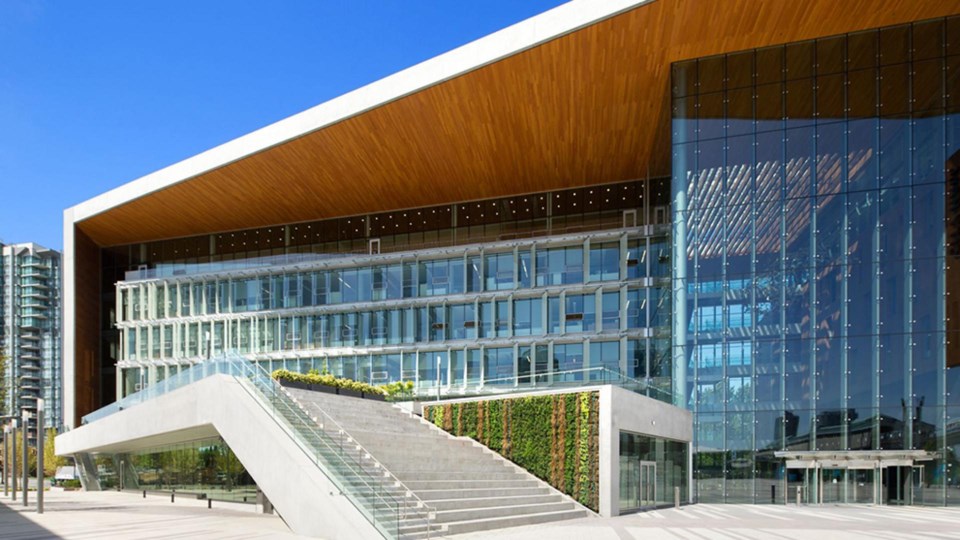Just 52 days before Mayor Doug McCallum hopes to be re-elected, he donned a hardhat and turned the sod to begin the Cloverdale Sport and Ice Complex project. He also promised something even bigger: a 60,000-seat stadium in Surrey, with no details about how much it would cost or how it would be financed.
The next day, at his Safe Surrey Coalition campaign kickoff, he revealed his preferred site: Fraser Highway and 164th, west of the Surrey Sport and Leisure Complex.
That’s a little more than offside, says Coun. Brenda Locke, one of McCallum’s four declared opponents for the mayoralty on Oct. 15.
Locke accuses McCallum of a diversionary boondoggle. Nobody has really lobbied for a multibillion-dollar facility during this term. She says the site is actually eyed by the Fleetwood Community Association for a cultural centre and sports fields.
“It's a 60,000-seat, white elephant they're going to build for millionaire athletes. At the end of the day, that’s what this is to me,” Locke said. “And we're in Surrey, struggling to get kids into sports fields and ice arenas and pools. We're so low on infrastructure in the city.”
Locke suggests it’s nothing more than political football, aimed at creating a debatable issue so that other issues don’t get the time needed for voters to decide who they want as mayor the next four years. McCallum’s twin 2018 promises, replacing light rail with SkyTrain and replacing the RCMP with a municipal police force, are taking much longer and costing much more than anticipated.
A new stadium would come with a massive price tag. The baseline for a 60,000-seat stadium is US$1.4 billion. That’s the budget for the NFL’s Buffalo Bills heavily subsidized new venue. They hope their new home is ready for the 2026 season.
The Lower Mainland already has a stadium, 1983-built, 2011-renovated B.C. Place Stadium in Vancouver. It’s one of the 16 host venues for the FIFA 2026 World Cup. The $260 million cost breakdown to host five games has not been revealed, but likely contains funds for another renovation.
B.C. Place is also proposed for opening and closing ceremonies of the 2030 Winter Olympics.
But the 54,500-seat venue rarely is full. Its primary tenants, the Vancouver Whitecaps and B.C. Lions, struggle to fill the lower bowl, according to official attendance figures released under freedom of information.
Canada’s World Cup-bound men’s national soccer team drew 14,809 for a CONCACAF Nations League match against Curacao on June 9, almost double the 7,487 who came to cheer on the Whitecaps against FC Dallas on May 18. The Lions drew 25,279 to their June 11 home opener against the Edmonton Elks, which included a pregame concert by One Republic. That was 9,000 fewer than the announced 34,082. Eight days earlier, only 5,722 watched an exhibition game against the Saskatchewan Roughriders.
Vancouver was briefly touted in 2021 as a destination for the Oakland A’s, who are looking for a new home. But the better bet is a new ballpark in Las Vegas, an attractive location for the pro sports industry since the 2018 legalization of sports gambling across the U.S.
Vancouver is not in the running for an NFL franchise. The Seattle Seahawks played one exhibition game in B.C. Place in 1998 against the San Francisco 49ers and could play a regular season game there in coming years under the NFL’s new 17-game format. The league is encouraging neutral site games and the Seahawks count B.C. in their marketing territory.
A stadium promise has figured in other political campaigns throughout the years. Most recently in 2018, when Fred Harding of the fringe, right-of-centre Vancouver 1st party floated one for South Vancouver.
In 1978, Pacific National Exhibition President Erwin Swangard proposed a stadium and convention centre, the Multiplex, beside the Agrodome, to replace the 1954-built Empire Stadium. The following year, the Whitecaps won Soccer Bowl ’79. At the Robson Square victory party, Mayor Jack Volrich got one of the biggest cheers of the day, when he promised a new stadium for the champions. He lost the civic election in 1980 to future premier Mike Harcourt.
Meanwhile, Bill Bennett’s Social Credit government eyed the Dominion Bridge factory (now the Bridge Studios) and the north side of the Port Mann Bridge, among other sites, before settling on False Creek for what became B.C. Place.
One of the biggest voices for the winning site was an area hotel investor, the future Vancouver mayor and future B.C. premier Gordon Campbell.
Metro Vancouver could’ve had a dome much sooner than 1983. In 1965, when Burnaby Mayor Alan Emmott was looking to stay in power, a group from Texas that lost out on the contract to build the Houston Astrodome visited. There was talk of a $15 million Burnaby dome that could host both hockey and football. Alas, Vancouver’s $6 million Pacific Coliseum got the green light and opened in 1968, the last year of Emmott’s decade in power.
Burnaby eventually became B.C.’s amateur sports hub, with the 1969-opened Swangard Stadium in Central Park.



